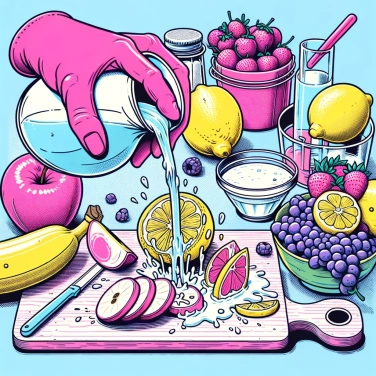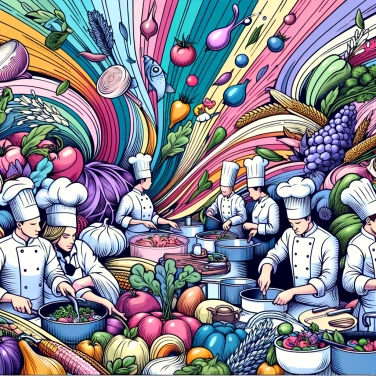Lemon contains ascorbic acid (vitamin C) which acts as an antioxidant. By oxidizing, this vitamin reduces the activity of the enzyme responsible for the browning of fruits.

When certain fruits like apples or pears are cut, the plant cells are damaged. This degradation releases an enzyme called polyphenol oxidase (or PPO). This enzyme reacts with the oxygen present in the air and transforms certain molecules in the fruit, the phenolic compounds, into brown pigments called quinones. These quinones then combine to form more complex brown compounds, responsible for the unappealing brown color. This phenomenon is completely natural, harmless, but not aesthetic, and it slightly alters the taste of the fruit, sometimes making it more bitter or less pleasant to eat. The longer the fruit is exposed to the air, the more the enzyme acts, and the browner it becomes.
Lemon mainly contains citric acid and ascorbic acid (vitamin C), acidic compounds capable of slowing down the browning of cut fruits. When you add a drizzle of lemon juice to fresh fruits, its acidity significantly lowers (and thus changes) the pH, which slows down the action of an enzyme responsible for browning, called polyphenol oxidase. In other words, thanks to lemon, the enzyme responsible for this phenomenon becomes much less effective. Ascorbic acid also acts as an antioxidant, blocking the action of oxygen that reacts with the fruit's compounds to form those unpleasant brown pigments. The result: your apples or avocados stay visually fresh and appealing for much longer.
Ascorbic acid, more commonly known as vitamin C, serves the practical role of a natural antioxidant. Its advantage lies in its ability to quickly interact with the free oxygen present on the surface of cut fruits. This seriously limits the activity of the enzymes responsible for browning, such as polyphenol oxidase. In simple terms, vitamin C directly captures the molecules that trigger oxidation reactions, thereby protecting cut fruits and slowing their color change. As a result, apples or bananas remain visually and tastefully appealing for a longer time.
Besides lemon, there are other simple tricks with natural ingredients that are just as effective. Pineapple juice, for example, naturally contains vitamin C which clearly slows down the browning process. The same goes for orange juice: its high content of ascorbic acid prevents oxidation. Some also use honey diluted in water, as its antioxidants form a protective layer around fruit pieces. Cinnamon, less known for this, can still limit the phenomenon thanks to its natural antioxidant properties. Finally, soaking in slightly salted water can also temporarily stop browning without significantly altering the taste.
Applying lemon juice quickly to a fruit stain often helps to remove it more easily due to its mildly acidic and bleaching properties.
Adding a few drops of lemon to a fruit salad not only enhances its appearance by preventing browning, but also boosts the flavor of the other ingredients, creating a fresh and harmonious taste.
The mechanism of enzymatic browning, known as the 'Maillard reaction', is also present in cooking: it is the same reaction that gives a beautiful golden color to pastries and breads.
Fresh kiwi and pineapple naturally contain enzymes (actinidin and bromelain) that can slow down the browning process when combined with other cut fruits.
In general, a drizzle of lemon juice can extend the freshness of cut fruits by a few hours to about a day. However, this depends on the type of fruit, the ambient temperature, and the amount of juice applied.
Usually, adding a slight drizzle of lemon does not significantly alter the taste but rather subtly adds a tangy and refreshing note. However, be careful not to apply it excessively, as it may overshadow the natural flavor of the fruits.
No, enzymatic browning does not necessarily indicate that the fruit has become unsuitable for consumption. This phenomenon primarily affects the appearance and slightly the taste of the fruit, but its nutritional value remains largely intact.
Yes, in the food industry, antioxidant agents such as citric acid, ascorbic acid, and sulfites are often used to maintain color and prolong the shelf life of freshly cut foods.
Yes, other citrus fruits like oranges or grapefruits can be used as they also contain ascorbic acid, but their effectiveness is lower than that of lemon due to a lower concentration of this active compound.

No one has answered this quiz yet, be the first!' :-)
Question 1/5